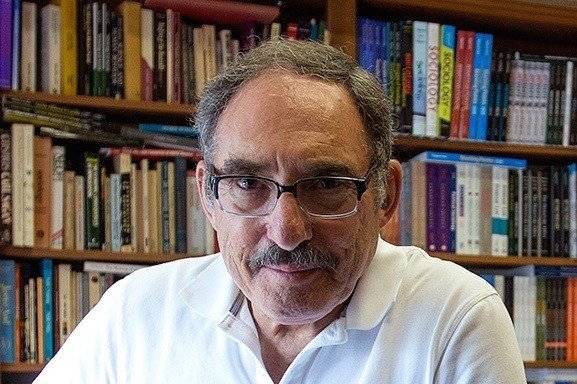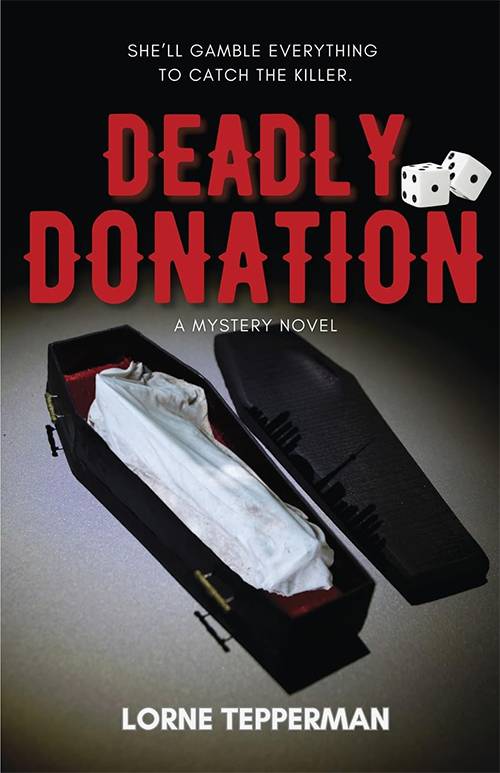Not your typical campus novel — Emeritus professor Lorne Tepperman’s ‘Deadly Donation’
by Sean McNeely

Lorne Tepperman, a professor emeritus at UC and the Faculty of Arts & Science’s Department of Sociology who has authored, co-authored, edited and co-edited a remarkable 88 academic books, has just written his first murder mystery novel.
Available now through the publisher and through Amazon, Deadly Donation opens with the murder of a despised philanthropist, and the police are left with plenty of suspects. Enter Rachel Tile, a 40-year-old professor and the philanthropist’s ex-wife, who uses her theoretical expertise and street smarts to crack the case.
But as the director of a cash-strapped School of Criminology at Strachan University, Rachel struggles to balance fundraising duties and personal obligations. As the investigation unfolds, Rachel discovers her life, her family and her marriage are all in danger.
“It’s a murder mystery, but there are other kinds of crime as well,” says Tepperman. “For one thing, there's a lot of white collar crime in it, because I have things to say about the topic of white collar criminals.”
There’s also sex, violence, gambling, addiction, and marital betrayal — all the juicy elements of a good murder mystery.
So what led to this shift to fiction?
“I've been reading crime novels for many, many years,” says Tepperman who retired from U of T in 2022. “I love reading fiction. In fact, I may have read far more fiction than non-fiction. Then, after I retired, I thought, ‘what's next?’”
The experience of writing his first novel brought with it new challenges, as well as a learning curve.
“My problem wasn't getting words down on the page,” he says. “It was figuring out how to make the plot move forward. What was hard for me was trying to figure how to pace the story and deciding how closely I wanted to adhere to the rules of the genre.

“In the end, I decided to take some liberties, but I had to become familiar with things that I’d never thought about before — the rules of writing mystery fiction, characterization, and so on. I'd never studied these things, so I had to learn them all by doing.”
As he got his footing, Tepperman found he loved having creative freedom.
“I would find myself laughing at some of the dialogue or getting almost teary because some of the relationships in there are very touching,” he says. “They're genuine, they're believable. Relations between Rachel and her best friend, Jen, and between her and her stepdaughter, Ellie, were very real for me.”
Tepperman also stuck to the steadfast rule, “write what you know” with the book being set at a local university, and the protagonist a university professor.
“I know a lot about universities; also, about problem gambling, violence, and families —I've done research on all of these topics. And not only have I done research, but I consider them extremely pressing issues, right now, especially gambling addiction.
“But it wasn't so much that I looked for opportunities to put stuff into the story that I already knew. It was that the things I knew about were things I care about. So as my story unfolded, these things came up naturally.”
Tepperman created Rachel’s character from an assortment of people he’s known — but he’s not naming names.
“Fictional characters are usually based on people we've met, people we've thought about, people that we've imagined after having met them, but not yet gotten to know them very well,” he says. “So I had some people in mind as I thought about Rachel. But I'm not going to tell you who they are. I don't want to get in trouble with anyone.
“Rachel has very admirable qualities, I think, but like most human beings she also has serious flaws and shortcomings. She’s extremely sensitive, but also very strong and insightful. And I really wanted to see how this kind of person was going to cope with the challenges that life threw at her.”
Though now a novelist, Tepperman couldn’t help but use his fictional tale to share some personal insights about our current society.
“I'd have to turn in my sociology membership card if I didn't have messages I wanted to communicate,” he says.
“It's a fictional society, but a society that in many respects, is like our own. And so the reader will find insights about wealth inequality, which is a gigantic problem that I've written about a lot in the last few years. In this book, I ask the reader to imagine even more extreme wealth inequality than already exists in Canada today.”
And through Rachel’s plight, Tepperman also shines a light on the challenges public institutions experience with underfunding.
“Rachel has to raise a lot of money, otherwise her School of Criminology is not going to have the funds it needs for scholarships, fellowships and pay for high quality faculty members,” he says.
“Rachel’s university, Strachan University, has recently been sold to an international consortium of investors named Hummingbird Industries, so none of her funding is coming from the Provincial government. She has to raise all her funds through donations, gifts, grants and tuition fees. Obviously, this is a much more severe condition than most universities face today, but it’s the direction that Ontario universities are headed. You can see this if you reflect on the possible privatization of Ontario highways, the Science Centre, Ontario Place, and other institutions I could name.”
Thankfully, Rachel emerges from this first book, Deadly Donation relatively unscathed. So Tepperman is busy working on her next case with some of the book’s other denizens of Strachan University, plus some new characters.
“I’m told that readers don't like to read stand-alone books, especially in the mystery genre. They like to read series, so I’m writing a series,” says Tepperman.
“And in writing the first book, I’ve discovered that my central characters have legs. I'd like to find out more about Rachel, Jen, Roxy, and a new character named Ronnie Packer. Rachel has grown stronger, more resourceful, and more insightful from the first to the second novel. In important ways, this second novel is quite different from the first one. But I want to see how this world of Strachan University unfolds.”